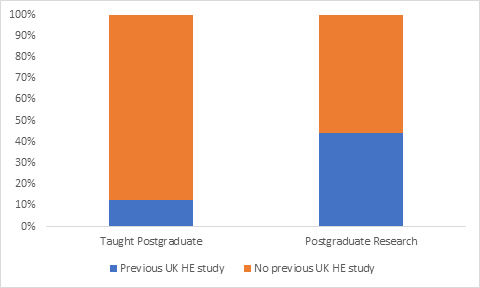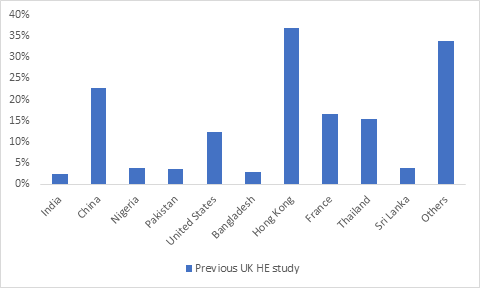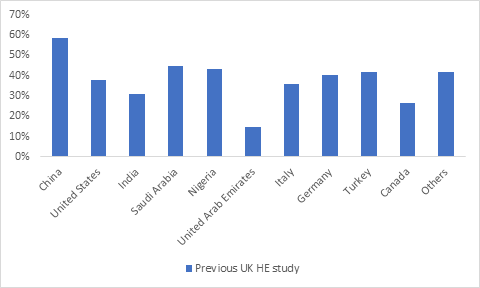You are here
Home ›Prior UK study a significant pathway for postgraduate recruitment
by Kevin Prest
01/09/2023
Higher Education Institutions

In the 2021/22 academic year, more than 396,000 international students started a course at a UK higher education institution. But not all of these students were new to the UK. Analysis of data from HESA shows that 15 per cent of all new international postgraduate students had studied in the UK in previous years. This illustrates the importance of students that continue to study in the UK after completing a previous course in the UK.
Prior UK study by level of course
Almost 265,000 new international students started UK postgraduate courses in 2021/22, of whom over 38,000 – or around 15 per cent – had previously studied other HE courses in the UK.
The majority of these students enrolled on taught postgraduate (PGT) programmes, mainly consisting of master’s degrees. Around 13 per cent of this group had already studied at a UK higher education institution before starting their current course.
While the number of postgraduate research (PGR) students – a category which mainly covers PhD programmes as well as research-based master’s degree courses – is lower in absolute terms, the proportion with prior UK study was even higher, at 44 per cent. This shows that the UK’s international competitiveness in research owes a great deal to students’ positive experience at lower levels of study.
Figure 1: New international postgraduate students’ prior UK HE study experience by study level, 2021/22

Source: HESA
Prior UK study by country of domicile
There were major differences in prior UK study patterns between students from different countries of origin. Looking at the top two sending countries for postgraduate students, India and China, less than 3 per cent of Indian students who started a UK postgraduate course in the 2021/22 academic year had previously studied in the UK, while the corresponding proportion for students from China was 23 per cent. Indeed, China accounted for almost half of all international PGT students with prior UK study experience. Although undergraduates make up a relatively higher proportion of inbound students from China compared to those coming from India, this does not explain the whole of the difference in prior UK study between these two countries.
These examples illustrate a broader regional trend. PGT students from Hong Kong were even more likely to have previously studied in the UK than their mainland counterparts – almost 37 per cent of this group had studied an HE course in the UK in the past – with similarly high proportions in other parts of East Asia like Malaysia and Singapore. On the other hand, students from South Asian countries like Pakistan and Bangladesh, as well as those from sub-Saharan African countries like Nigeria, were much less likely to have previously studied in the UK.
There was also a noticeable difference between EU and non-EU countries, with 29 per cent of EU-domiciled PGT students having previously studied in the UK compared to 12 per cent of those from non-EU countries. As with the comparison between China and India, part of this difference can be explained by the relatively higher proportion of undergraduates among EU students in the UK.. One possible reason is the influence of exchange programmes like ERASMUS+, with students’ experience of exchange programmes during their undergraduate course making them more likely to study a higher degree in the UK.
Figure 2: New international taught postgraduate students’ prior UK HE study experience by country of domicile (top 10 student sources), 2021/22

Source: HESA
Even in countries where previous UK study was rare among PGT students, a significant number of PGR students had already completed a UK HE course before starting their current programme – for example, 31 per cent of Indian PGR students and 44 per cent of Nigerians had previously studied in the UK. However, China again stood out at this level, with more than 58 per cent of new PGR students having previously studied a UK HE programme.
Figure 3: New international postgraduate research students’ prior UK HE study experience by country of domicile (top 10 student sources), 2021/22

Source: HESA
Prior UK study by subject area and institution
Looking at the three most popular subject areas for taught postgraduate courses, the proportions of new international students having prior UK study experience in the fields of business, computing and engineering were 11, 8 and 11 per cent respectively. This level of variation is far smaller than the differences we can see across countries or levels of study.
Looking at different institutions, in general the data shows that universities that perform more strongly in international rankings tend to recruit a higher proportion of students with previous UK study. This supports observations that many international students – particularly those from China and other parts of East Asia – tend to prefer to “trade up” to a higher-ranking university for postgraduate study after completing their first degree in the UK.
Implications for UK HEIs
The large number of students starting a postgraduate programme after previously studying in the UK shows that this is an important recruitment channel for UK HEIs. It also highlights the importance of a positive student experience at the undergraduate level as a driver for choosing to study a postgraduate course in the UK, and to an even greater extent the importance of high-quality bachelor’s or master’s degree courses in attracting students to study a PhD and contribute to the UK’s research ambitions.
While this analysis was not broken down by the characteristics of students’ previous courses (such as level, subject area or period of study), the higher proportion of EU students with prior UK study is likely to have been at least partly influenced by the greater availability of exchange partnerships to these students. The British Council’s research with international students has consistently shown that shorter-term overseas study experiences like exchange programmes are an important factor influencing decisions to study abroad in the future, so maintaining these partnerships even after the end of programmes like ERASMUS+ can help to support postgraduate recruitment.
The large number of students entering postgraduate programmes after previously studying in the UK also has implications for undergraduate student recruitment. In many cases, students plan to stay abroad for more than just a bachelor's degree, and highlighting opportunities to do so can help to strengthen the UK’s position as an undergraduate study destination.
Notes on methodology
The data in this article is based on information from the Higher Education Statistics Agency (HESA)’s Student Record and Student Alternative Record. Students starting a new HE course in the UK were traced to see if they had previously appeared in HESA’s data in previous years.
In general, students would only be classed as having previous UK study if they had studied at a UK HEI. This does not include students who studied in the UK below HE level (for example at a school or FE college), nor does it include most students who studied a transnational education or distance learning programme outside the UK. However, students who were in the UK on a visiting or exchange programme would be counted as having prior UK HE study, as would students who started a course but left before completing it. During the Covid-19 pandemic students who were enrolled on a course that was designed to be studied in the UK were also included in this data even if they were forced to study remotely from their home country due to the pandemic.
Theme:
Latest Blog Posts
04/03/2024




Add new comment
Please note that comments by non-members are moderated. They do not appear on the site until they have been approved. Comments by registered members appear here immediately. Your email address will not be published. All fields are required.